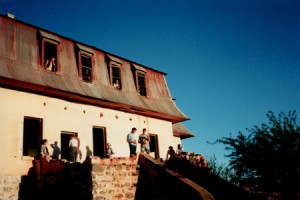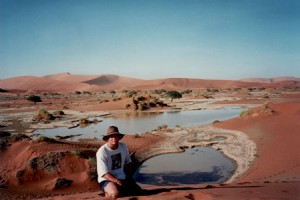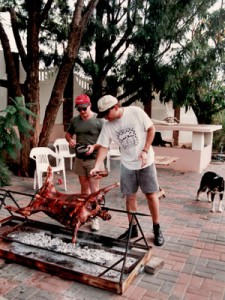It could be said that local travel made me what I am today. At the very least, it brought me to where I am today, which has had a huge impact on who I am. Many years ago, at a time in my life when I was searching for something, I travelled to Namibia. Reality there was a little different to my expectations and it proved harder to find my feet than I had anticipated. Fortunately, I decided to ‘go local’. I went where I knew I could find people who would help me feel more at home in Namibia. I found this… and much more. By getting under the hood of the place, I discovered something that really drew me in. And I just never left.
Looking back
The Cardboard Box Travel Shop is a result of my husband and me having run a backpackers hostel in Windhoek. As Namibia was (and to a large extent still is) notoriously difficult to get around, mosty due to a complete lack of public transport, a large part of what we did involved helping people find ways to travel around this country that we’re both passionate about and want to share with others. In the beginning, we necessarily focused on budget travel, but eventually developed into a service embracing everything from the very up-market right through to the most meagre of pockets. In 2004, after 11 years of working in hospitality, the travel side of the business had grown so much that we had to make it a separate entity. Today, the Cardboard Box Travel Shop, which started life in what could only be described as a broom cupboard, employs 15 people, all Namibians, and is based in a large, lovingly restored, historic building close to the centre of Windhoek.
Running a travel business was certainly not something I foresaw. Soon after having completed a degree in architecture in the UK, I came to the realisation that I had not actually been taught how to build anything, at least not in a practical, hands-on way. I therefore decided to volunteer for an NGO in Namibia that helped women construct their own houses.

The Neu Heusis (or spookhuis, meaning ghost house) is an old abandoned house 30 kilometres west of Windhoek frequently visited for sundowners
On arrival in Namibia, I soon discovered that Windhoek can be a difficult place to meet people. So I headed to the only backpackers in town knowing that they’re good gathering points for both travellers and locals. The Cardboard Box proved to be exactly that and was where I met my future husband, Aulden. It was like a big family and most days saw us enjoying a braai, going out to a restaurant (where I eventually learned the error of my previously vegetarian ways) or club, or getting out of town for a sundowner. In town, my favourite spots included Club Thriller in the old township area of Katutura; Joe’s Beerhouse on Independence Avenue; the Warehouse Theatre for live music and various performances; as well as Neu Heusis (or spookhuis meaning ghost house), an old abandoned house 30 kilometres west of town.
However, I think the real reason I fell in love with all of Namibia was because of trips into the bush and desert. One such trip was to Sossusvlei when it filled with water for the first time in over a decade. Aulden and I dropped everything, spent a day arranging transport and trying to entice as many people as we could to join us and then headed south. We were some of the first people to enter the Namib-Naukluft Park after the flooding and had to swim across what is normally the 4×4 car park just to get to Sossusvlei. It was truly stunning.
Making Local Travel matter
Unfortunately, with the growth of the business and our move away from accommodation, we were no longer as involved with our guests as we had been, but we knew we still had to offer insight into what Namibia is really about and show people what a beautiful country it is. We therefore try to make sure that our consultants regularly visit lodges or go on safari trips so they can get firsthand experience of what they are selling. Another unintentionally unique quality of our office is how multicultural it is – representing seven of the countrys ethnic groups – which makes our understanding of cultural events more personal, whether it be the Herero people’s celebrations at the end of August or Wika (Windhoek beer carnival) in April.
So why do we feel that ‘local travel’ is important? From a traveller’s perspective there seem to be several benefits. First, you deal with people who are in the country that you want to visit and hopefully offer the most up-to-date information about new lodges that have opened but not yet marketed to overseas companies, or using local guides that go under the global radar. Second, you have access to more in-depth knowledge about the country, such as the best times of year to visit, suitable accommodation, weather conditions and what to bring with you, local customs, driving tips, or just the best spot for a good meal. Then, third, is the reassurance that if anything goes wrong, there is someone in-country that can be easily reached for advice and assistance.
From our point of view, there’s greater incentive to promote locally based and locally owned operations, as well as to use responsible businesses that do their best to protect the environment and minimise the negative impact of tourism.
As in important side note, weve often heard it debated that, despite our attention to responsible, sustainable and local travel, if we were truly being sensitive to the environment we would not be encouraging people to jump on a plane and travel around Namibia at all. In addition, Namibia has limited tourism facilities and so while some of what we offer may not be ideal, it makes the most sense for a particular client. At the end of the day, though, were trying to strike a balance between embracing ethical work practices, staying financially viable and providing a good level of service. At this stage we have not seen a major interest in people wanting to book ethical travel. Until this happens, it is always going to be harder for us to promote it.
Rachael Harlech-Jones co-owns and co-operates The Cardboard Box Travel Shop, which is also the whl.travel local connection in Namibia



Nice post Rachael
Posted by Len Cordiner | June 9, 2010, 12:34 pmthank you shear information with us. and very useful post.you thinking very nice.i am impressed.
Posted by buyairjordan | June 17, 2010, 8:01 am